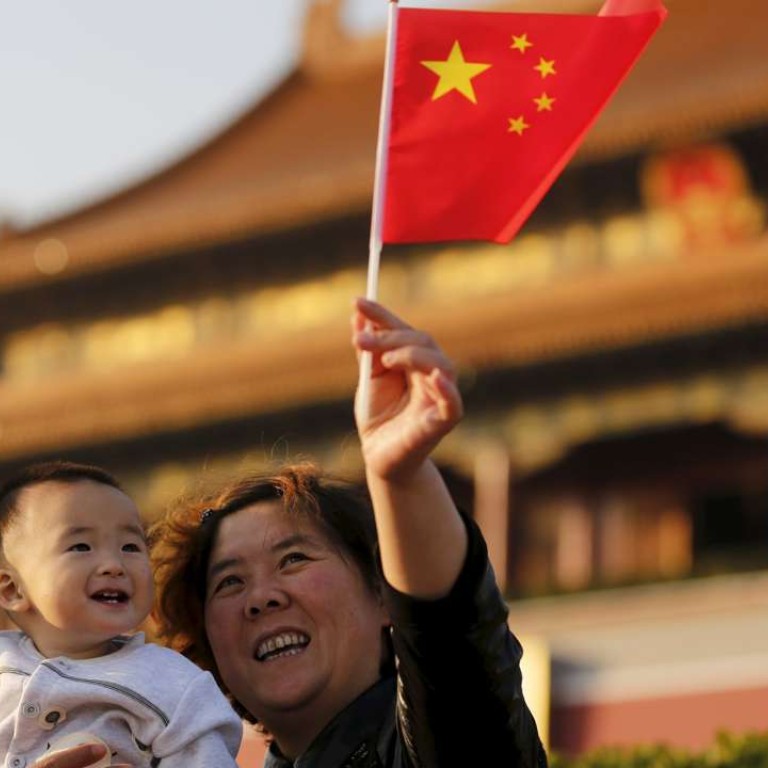
China must scrap remaining birth control policies to avert demographic crisis, says medical researcher
Vocal critic of the system Yi Fuxian says nation needs to address greying population and fall in numbers of people of working age
Yi Fuxian, one of the most vocal opponents of China’s birth control policies, says the government should scrap the remaining measures to address a looming demographic crisis that is pushing the nation into Japan’s path of economic stagnation.
China needs to encourage couples to have more children to address the country’s looming demographic crisis as its population ages and the number of people of working age falls, according to Yi, a medical researcher originally from Hunan province who now works as a scientist at the University of Wisconsin-Madison in the United States.
From 2015, some couples in some areas were allowed to have a second child and the pilot scheme became national policy at the start of this year, ending over three decades of the one-child policy.
Yi said the pilot effort had proved a failure as fertility rates continued to decline in 2015. Instead of a “baby boom”, China’s new births in 2015 declined by 320,000. China’s fertility rate was less than 1.3 births per woman, Yi said, among the world’s lowest.
Kids are alright: China allows two children for all couples, ending decades-old policy
“It’s already too late … China’s population is ageing quickly and will start to shrink soon and there’s no way for China to maintain strong economic growth under such demographic conditions,” said Yi, who the wrote the book Big Country With an Empty Nest, detailing China’s demographic challenges.
China’s strict birth control policies were introduced in early 1980s, with couples breaking the laws sometimes facing punitive fines and even forced abortions.
China’s famous film director Zhang Yimou was fined 7.5 million yuan (HK$9 million) for having more than one child, while the blind lawyer Chen Guangcheng came to prominence for his work fighting against forced abortions.
The economic, social and cultural damage caused by three decades of limiting China’s population growth have already begun to emerge, according to Yi.
China’s population is ageing quickly and will start to shrink soon and there’s no way for China to maintain strong economic growth under such demographic conditions
China’s population of working age peaked in 2013. The shortfall in the number of workers is driving up labour costs and eroding China’s global economic competitiveness, he said.
China’s rust-belt zones with populations frozen or even shrinking in size are showing persistent economic weakness, impeding government plans to revive their economies. The northeastern province of Heilongjiang, for instance, has started to allow couples in areas on the border with Russia to try for a third child.
“Without enough people, China’s grand economic plans such as urbanisation and revitalization of northeastern provinces became groundless,” said Yi.
“China had previously regarded birth control as the most difficult task in the world, but it will soon find out that boosting fertility rates is even harder,” Yi said, citing the experiences of Japan, South Korea, Taiwan and Hong Kong.
Yi trained as a doctor and earns his living in the United States working as a scientist rather than as a demographic researcher, but he said he became a ferocious opponent of China’s family planning policy because he couldn’t sit idly by to see “my own nation’s suicide”.
Once labelled as a national traitor for his attacks on China’s “fundamental national policy”, Yi was unwelcome in his homeland and did not return to China for a decade before 2010.
He started to gain in popularity in recent years after the negative impacts of China’s one-child policy became visible. He then took annual leave to tour around China and give lectures at universities.

Yi said in his interview that he receives no third-party funding for his research on demographics. “When I got the invitation [for 2016 Boao Forum], I thought it was a fake email,” he said. “But then I told the organisers I don’t have sufficient budget to attend the forum, so the organisers generously provided me with free air tickets – in business class.”
China’s latest official demographic survey shows a rapidly ageing population, with growth in numbers slowing.
China has 221.8 million people aged 60 or over, according to the latest figures, or 16.15 per cent of the population. This is 2.89 percentage points higher than the census result five years ago, according to China’s statistics agency.
Zuo Xuejin, a renowned demographics researcher at the Shanghai Academy of Social Sciences, said China should remove punitive measures, such as imposing “social support fees” on couples who have more children than the family planning policies allow.
Author Mei Fong talks one-child policy’s mind-boggling impact on China
The government should, instead, encourage young couples to have more children, Zuo said. The government could, for instance, provide subsidies to employers who grant maternity leave to employees.
The apparatus to enforce the nation’s birth control policies, however, remains firmly in place.
About half a million people work at state, provincial, municipal, county or township agencies whose main job is to enforce and implement family planning regulations.
After his interview with the Post Yi received a phone call notifying him that his scheduled speech at a university in Beijing that night had been cancelled.
“The National Health and Family Planning Commission intervened,” said Yi.
Phone calls and faxed questions to the commission about Yi went unanswered.
Additional reporting by Wendy Wu

